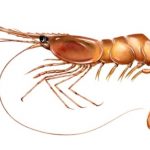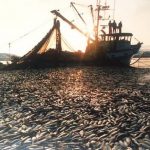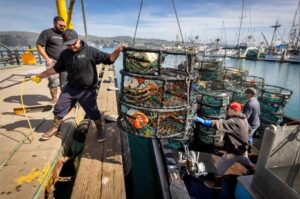Tag Archives: vessel strikes

Experts say Trump is right yet all wrong on whale deaths
It is the first commercial-scale offshore wind energy project in the U.S. But is Vineyard Wind, under construction off the coast of Massachusetts, contributing to an increase in whale strandings? That’s what President-elect Donald Trump suggested at a Tuesday press conference, as he vowed to stop new offshore wind farms during his administration. “You see what’s happening up in the Massachusetts area with the whales,” Trump said. “They had two whales wash ashore in a 17-year period. And now they had fourteen this season. The windmills are driving the whales crazy.” Actually, what may be driving the whale’s crazy is the noise generated by the construction of the wind farm. It involves the placement of 62 turbines, one nautical mile apart. Video, more, >>CLICK TO READ<<08:01
Biden’s Policies Threaten Small Lobster Fishers and Right Whales
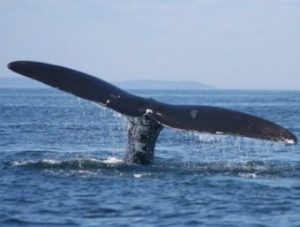 While lobstermen likely haven’t been contributing to NARW deaths, it is undisputed that vessel strikes, both in U.S. and foreign waters, have. Which brings us to the Biden administration’s decision to construct thousands of offshore wind turbines smack-dab in the middle of the whale’s migration route and habitat. Biden’s East Coast offshore wind initiative could qualify as an extinction level event for the North Atlantic right whale. Despite this, the Biden administration plans to build 30,000 megawatts of traditional offshore wind facilities (with structures attached to the ocean floor) in federal waters by 2030, and an additional 15,000 megawatts of floating industrial offshore wind power by 2035. more, >>CLICK TO READ<< 06:31
While lobstermen likely haven’t been contributing to NARW deaths, it is undisputed that vessel strikes, both in U.S. and foreign waters, have. Which brings us to the Biden administration’s decision to construct thousands of offshore wind turbines smack-dab in the middle of the whale’s migration route and habitat. Biden’s East Coast offshore wind initiative could qualify as an extinction level event for the North Atlantic right whale. Despite this, the Biden administration plans to build 30,000 megawatts of traditional offshore wind facilities (with structures attached to the ocean floor) in federal waters by 2030, and an additional 15,000 megawatts of floating industrial offshore wind power by 2035. more, >>CLICK TO READ<< 06:31
Where Have All The Right Whales Gone?
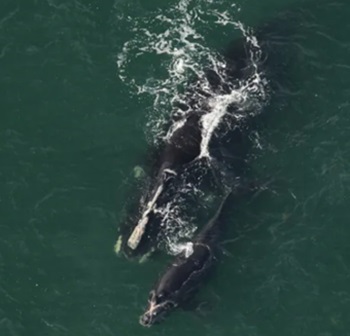 Marine researchers have mapped the density of one of the most endangered large whale species worldwide, the North Atlantic right whale, using newly analyzed data to predict and help avoid whales’ harmful, even fatal, exposure to commercial fishing and vessel strikes. Duke University’s Marine Geospatial Ecology Lab led a collaboration of 11 institutions in the United States that pooled 17 years of available visual survey data covering 9.7 million square kilometers of the U.S. Atlantic – roughly the same area as the entire contiguous United States. more, >>click to read<< 16:37
Marine researchers have mapped the density of one of the most endangered large whale species worldwide, the North Atlantic right whale, using newly analyzed data to predict and help avoid whales’ harmful, even fatal, exposure to commercial fishing and vessel strikes. Duke University’s Marine Geospatial Ecology Lab led a collaboration of 11 institutions in the United States that pooled 17 years of available visual survey data covering 9.7 million square kilometers of the U.S. Atlantic – roughly the same area as the entire contiguous United States. more, >>click to read<< 16:37
72 whales have died on the East Coast in a year. NOAA must take action.
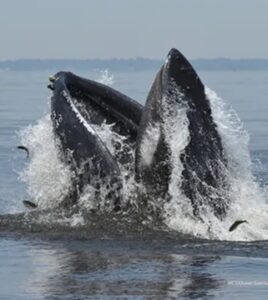 So, what have we learned from the recent whale deaths off the East Coast — 72 since December 2022? They have compelled local communities to question the risks and benefits of offshore wind. Sadly, these same deaths have revealed a disturbing lack of curiosity among the oil-companies-turned-offshore-wind-developers, the National Oceanic and Atmospheric Administration and even some marine scientists who rush to the cameras every time a whale dies to point fingers away from offshore wind development along the eastern seaboard. Proponents of offshore wind are quick to blame global warming (to which of course their solution is offshore wind turbines) moving feeding grounds into shipping lanes and general episodic “vessel strikes” for these deaths. Many hope to close the investigation within the same day or two because the last thing they need is to have two dead whales, less than 30 miles apart, stealing the headlines for a full week. Proponents of these systems are also quick to claim that offshore wind will not harm marine mammals, yet their own action seemingly contradicts that. >>click to read<< 16:49
So, what have we learned from the recent whale deaths off the East Coast — 72 since December 2022? They have compelled local communities to question the risks and benefits of offshore wind. Sadly, these same deaths have revealed a disturbing lack of curiosity among the oil-companies-turned-offshore-wind-developers, the National Oceanic and Atmospheric Administration and even some marine scientists who rush to the cameras every time a whale dies to point fingers away from offshore wind development along the eastern seaboard. Proponents of offshore wind are quick to blame global warming (to which of course their solution is offshore wind turbines) moving feeding grounds into shipping lanes and general episodic “vessel strikes” for these deaths. Many hope to close the investigation within the same day or two because the last thing they need is to have two dead whales, less than 30 miles apart, stealing the headlines for a full week. Proponents of these systems are also quick to claim that offshore wind will not harm marine mammals, yet their own action seemingly contradicts that. >>click to read<< 16:49
Will small boats soon have to slow down off NC to protect North Atlantic Right Whales?
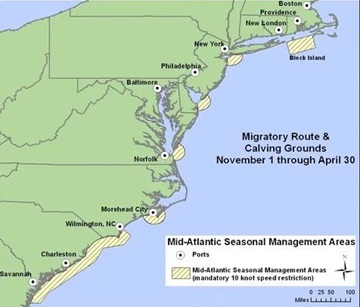 Vessel speed limits to help avoid fatal collisions between ships and one of the most endangered animals in the world that has fallen to around 350 individuals have gone back into effect off the U.S. Southeastern coast, including parts of North Carolina. The seasonal-management areas, or SMAs, limit the speed of most vessels 65 feet or longer to 10 knots, about 11.5 mph, in areas known to have heavy ship traffic that are also migratory routes or known calving grounds for the North Atlantic right whale. The go-slow zones, which run from November through April and have been in effect for more than a decade, extend about 20 nautical miles, or 23 miles, offshore and include areas around Morehead City and Beaufort and within 23 miles from shore between Wilmington and Brunswick, Ga. >>click to read<< 15:46
Vessel speed limits to help avoid fatal collisions between ships and one of the most endangered animals in the world that has fallen to around 350 individuals have gone back into effect off the U.S. Southeastern coast, including parts of North Carolina. The seasonal-management areas, or SMAs, limit the speed of most vessels 65 feet or longer to 10 knots, about 11.5 mph, in areas known to have heavy ship traffic that are also migratory routes or known calving grounds for the North Atlantic right whale. The go-slow zones, which run from November through April and have been in effect for more than a decade, extend about 20 nautical miles, or 23 miles, offshore and include areas around Morehead City and Beaufort and within 23 miles from shore between Wilmington and Brunswick, Ga. >>click to read<< 15:46

Biden-Harris Administration Announces $82 Million For Endangered North Atlantic Right Whales
Today, the Department of Commerce and NOAA announced next steps to conserve and recover endangered North Atlantic right whales with $82 million in funding from the Inflation Reduction Act — the largest climate and conservation investment in history. This announcement comes during Climate Week and is part of the $2.6 billion framework to invest in coastal resilience that NOAA announced earlier this year. North Atlantic right whales are approaching extinction with fewer than 350 individuals remaining, including fewer than 70 reproductively active females. Today’s funding provides an unprecedented opportunity to address the primary threats to the species — entanglements in fishing gear and vessel strikes — with new technologies and approaches. >>click to read<< 12:41
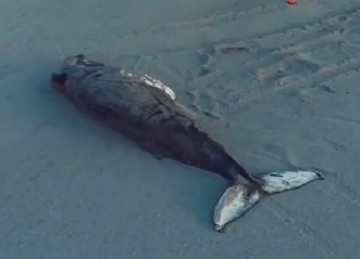
Whale found dead in South Jersey likely struck by vessel
The Marine Mammal Stranding Center said Sunday that preliminary results of a necropsy on the humpback whale that washed up Thursday on the North End Natural Area in Brigantine indicates that the animal had “blunt trauma injuries consistent with those from a vessel strike.” “Injuries and hemorrhaging were observed on the head and thoracic region, as well as along the right side and the pectoral flipper,” the center said in a statement. “These findings will be confirmed through laboratory analysis in the coming weeks.” Brigantine, just north of Atlantic City, has seen two other dead whales on its beaches in recent weeks, among the seven whale deaths in a little over a month in New Jersey and New York. >click to read<10:16

Why Was Lobster Red Listed? Defending Lobster Fishing
In the early 1970’s I was the youngest licensed lobsterman in the state of Connecticut (10 years old). I put my traps out off of Stamford harbor, pulling them in my 10′ Boston Whaler with a 8hp Envinrude. Sales of the lobster kept me in gas. Baiting the traps and dealing with the catch (mostly ghost crabs) put me off of crustaceans. I also love whales, although they do scare me ever since one bumped the boat I was sailing in the Gulf of Maine in the summer of ’81. So I had to read this The New York Times article: To Save Whales, Don’t Eat Lobster, Watchdog Group Says. And it’s….terrible. Graph, photos, >click to read< Written by Perry Boyle 08:55
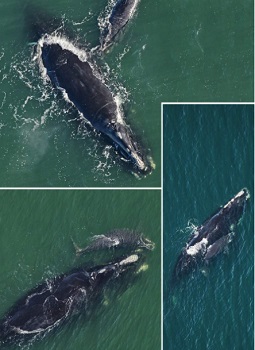
Three New Calves! North Atlantic Right Whale calving season is now underway
Right whales are an endangered species that usually migrate south along the Georgia and Florida coastline to give birth to their calves. The Florida Fish and Wildlife Conservation Commission announced over the weekend that calving season is now underway and lasts through March. In the 2020 calving season, there were 10 calves born, which was up from seven in the 2019 season. Despite the increase in calves, the species is still endangered. In the 2020 calving season, there were 10 calves born, which was up from seven in the 2019 season.>click to read< 15:27
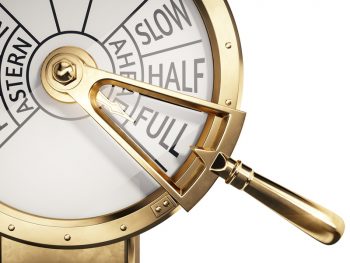
Report: 4 of 5 Gulf of St. Lawrence area right whale deaths investigated last year were caused by ship strikes
The report, compiled by the Marine Animal Response Society and Canadian Wildlife Health Cooperative, says vessel strikes caused four out of the five whale deaths investigated last year. A total of nine right whales were found dead in and around the Gulf of St. Lawrence in 2019. The report released Wednesday focused on the necropsy results for five right whales, all found dead between June and July 2019. It found vessel strikes caused the death of four of them, but the necropsy investigation could not determine the cause of death of the fifth. >click to read< 14:42
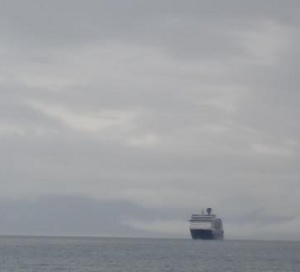
Researchers, marine pilots work to prevent vessel strikes from killing Alaska whales
Over the past decade, federal officials have logged 77 incidents of vessels hitting whales in Alaska waters. About three-quarters of those, were endangered humpbacks. But, it’s not clear why those strikes keep happening. A group of federal researchers and marine pilots have teamed up to combine what scientists know about whale behavior with what marine pilots know about ships.,,, That’s important as NOAA has logged 182 whale strikes in U.S. waters over the last decade. But that’s an undercount: ships aren’t legally required to report when they hit whale. And sometimes they don’t even know it’s happened. >click to read< 12:18
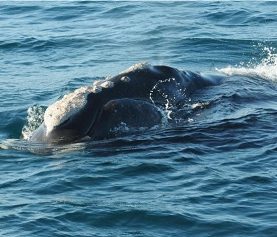
Maine lobster group blames Canada for most right whale deaths, injuries. Perhaps its the data doing the blaming.
McCarron claims Maine lobstermen were pressured to reach an agreement to avoid “jeopardy” from a pending and separate NOAA review of right whale risk-reduction measures for the lobster fishery, a process known as a “biological opinion.” A NOAA spokesperson said a statement from the agency that will respond to the Maine Lobstermen’s Association concerns is expected Thursday.,,, Canadian and American environmentalists expressed disappointment,,, >click to read< 10:11

































